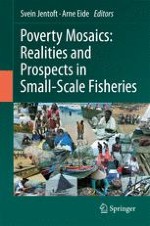2011 | OriginalPaper | Buchkapitel
12. Community Response: Decline of the Chambo in Lake Malawi’s Southeast Arm
verfasst von : Mafaniso Hara
Erschienen in: Poverty Mosaics: Realities and Prospects in Small-Scale Fisheries
Verlag: Springer Netherlands
Aktivieren Sie unsere intelligente Suche, um passende Fachinhalte oder Patente zu finden.
Wählen Sie Textabschnitte aus um mit Künstlicher Intelligenz passenden Patente zu finden. powered by
Markieren Sie Textabschnitte, um KI-gestützt weitere passende Inhalte zu finden. powered by
